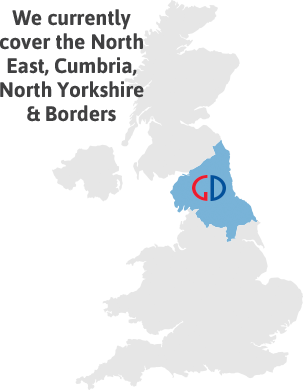FAQs
How long is the quotation valid for?
Once the report and quotation for works are processed and received by the client the costs quoted are valid for a period of three months
What method is used to install a Damp Proof Course (DPC)?
As the mortar beds are the only continuous passage up the wall structure the DPC is injected horizontally in the selected mortar bed using our ® Dryzone system in accordance with British Standard 6576:2005 Code of practice for diagnosis of rising damp in walls of buildings and installation of chemical damp proof courses.
Is the initial survey free?
Here at General Damp Proofing we endeavour to provide a free local survey whenever possible. Surveys further a field will incur initial charges, however if we carry out the works as per quotation the survey fee is normally refunded( deducted from the invoice)
Is the work guaranteed and for how long is it guaranteed?
Most remedial works carry a company guarantee of between 10 -20 years see your quotation for the length of guarantee specified as works vary between treatments and properties. For an extra one off payment, this guarantee can be insured in the unlikely event we cease trading
Can I live in my property while the work is carried out
It will depend on each individual case, we try as far as is reasonably practicable to keep dust and rubble to a minimum during the works. Dust settlement after the completion of works is unavoidable, and it usually takes a week or two to cease, although ventilating the property accelerates this significantly. We will discuss this with you prior to any work commencing.
Why does the plaster have to be removed during a DPC, it does not look to bad?
The plaster will contain salts carried up from the ground, such as chlorides and nitrates which are hygroscopic and have the ability to absorb moisture from the atmosphere, which in cases of high humidity can cause continuing dampness to the internal wall surfaces. Replacing this plaster resolves the problem and using a salt inhibitor in the sand/cement backing coat will prevent any residual salts in the brickwork from migrating into the plaster after the rising damp has been controlled.
Why should I use a Certified Surveyor in Remedial Treatments (CSRT) surveyor?
A CSRT surveyor has past three stringent exams set by the industries governing body and been questioned in front of a panel of experts to test their knowledge of remedial treatments. Only when all three exams are passed, damp, timber and health and safety is the CSRT awarded, this is also a costly process in time and fees. If a company cannot be bothered to spend the time to study, to sit exams or is not prepared for the financial outlay that company is selling you the customer short!
How long does the work take?
Works usually have to take a minimum of two visits to the property over two separate days. Some smaller jobs can be done in 3-4 days, while others will take a week. A full DPC and plastering to an average three bed semi will take 5-6 days from start to finish.
How long after the work is completed on treated walls can I re-decorate?
This is a contentious issue, however we usually recommend that treated walls are painted using a water based emulsion(strictly not vinyl paint or wallpaper) within for to six weeks. The water based emulsion allows the walls to breath and dry out naturally. The worst that can happen is that some flaking may occur, the wall can be brushed and patched up with fresh paint. We do recommend that wall paper is not applied for a period of twelve months after treatments are completed.
Prior to works commencing what am I responsible for, or what do I need to do?
The clients responsibilities include as a minimum the following depending on the scope and type of works, and we accept no liabilities for the clients failures to carry out these prior to our operators arrival on site:
- Remove furniture, fitted units and fixtures as agreed
- Remove and refit radiators
- Remove and refit skirting boards
- Remove floor coverings to include carpets, linoleum, underlay and gripper rods
- Carry out any necessary repairs to rain water goods and re-pointing
- Provide mains electricity use of our electric generators will incur a charge approx £50.00 per day
- Remove electric sockets, light switches, aerial connectors, sky, cable or internet connections and alarm sensors and cables
- Remove sink units, baths, toilets and cisterns etc and refit
- To carry out any decorative plasterwork, coving etc
- Provide access
- Provide water supply
- Remove and replace fibreglass insulation as directed
- Remove computers and all electrical equipment and appliances
- Cover any furniture fixture or fittings in that cannot be removed from the work area or in adjacent rooms.







